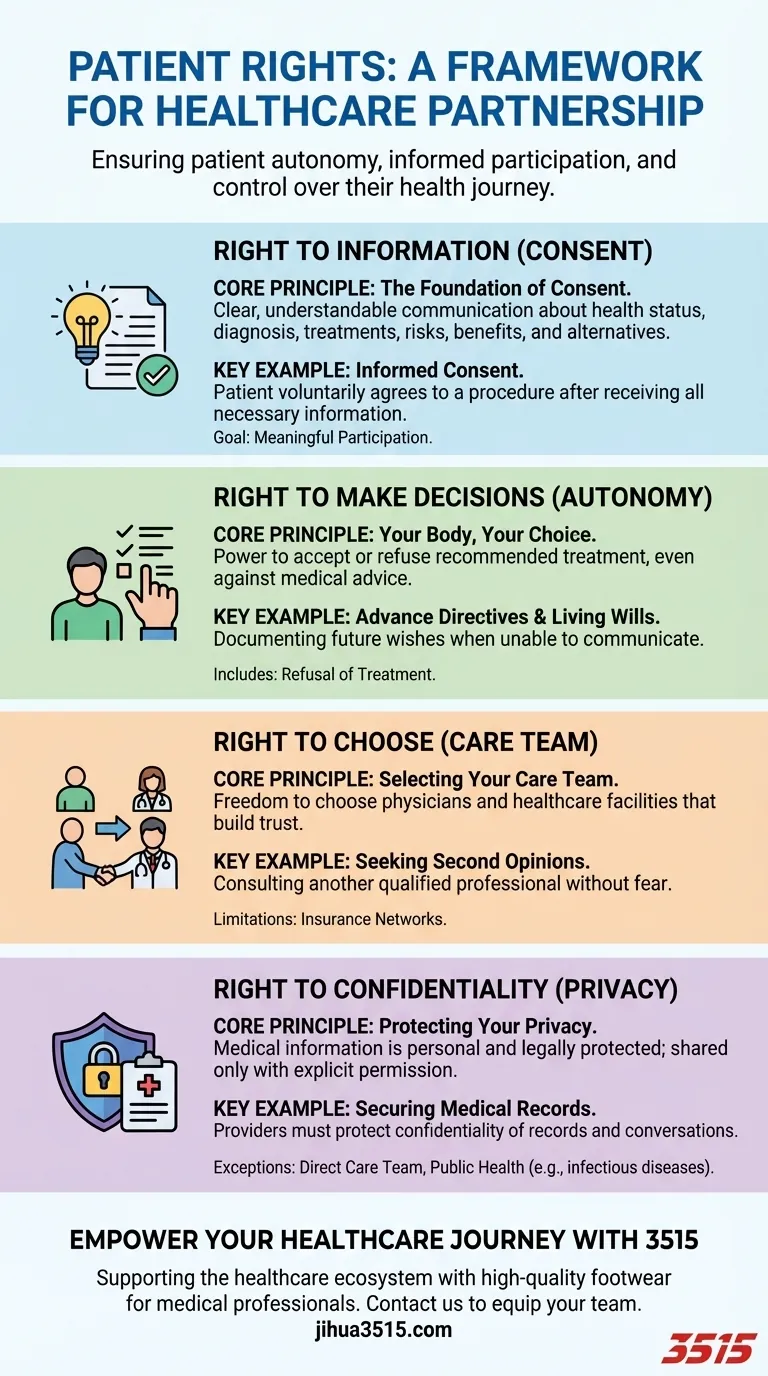At its core, a patient's rights are a framework ensuring they remain in control of their health journey. The fundamental rights that should always be checked include the right to receive clear information, the right to make treatment decisions, the right to choose a provider, and the right to confidentiality of personal health information.
These rights are not merely a checklist; they form the basis of a respectful partnership between a patient and their healthcare provider, ensuring patient autonomy and informed participation are at the center of all medical care.

The Right to Information: The Foundation of Consent
The right to be informed is the cornerstone upon which all other patient rights are built. Without clear, understandable information, a patient cannot meaningfully participate in their own care.
What This Means in Practice
This right obligates healthcare providers to communicate openly about a patient's health status. This includes details about a diagnosis, the purpose of proposed treatments, potential risks and benefits, and alternative options available.
The Goal of Informed Consent
The ultimate purpose is to enable informed consent. This is the process where a patient, armed with all necessary information, voluntarily agrees to a specific medical procedure or treatment plan.
The Right to Make Decisions: Your Body, Your Choice
This principle codifies a patient's autonomy over their own body. It empowers the individual to be the final arbiter of what medical interventions they receive.
The Power to Accept or Refuse
A patient has the definitive right to accept or refuse a recommended treatment. This holds true even if that decision goes against a provider's medical advice.
Planning for the Future
This right also extends to future medical care. Patients can articulate their wishes through legal documents like advance directives or a living will, ensuring their decisions are honored even if they become unable to communicate them later.
The Right to Choose: Selecting Your Care Team
Patients generally have the right to select the physicians and healthcare facilities that provide their care. This fosters trust and ensures a patient is comfortable with their medical team.
Choosing Your Physician
This includes the ability to choose a primary care physician as well as specialists. This choice allows a patient to find a provider whose approach and communication style aligns with their needs.
Seeking Second Opinions
A crucial aspect of this right is the ability to seek a second opinion from another qualified professional without fear of compromising the quality of their current care.
The Right to Confidentiality: Protecting Your Privacy
A patient's medical information is deeply personal and legally protected. This right ensures that sensitive details shared with a provider remain private.
Securing Your Health Information
Healthcare providers have a legal and ethical duty to protect the confidentiality of a patient's medical records and any conversations about their care. This information cannot be disclosed to others without the patient's explicit permission.
Exceptions to the Rule
Confidentiality is not absolute. Information may be shared among the patient's direct care team to ensure coordinated treatment, or when required by law, such as reporting certain infectious diseases to public health authorities.
Understanding the Practical Limitations
While these rights are fundamental, they can be subject to real-world constraints that patients should understand.
Insurance and Network Restrictions
The right to choose a doctor or hospital is often limited by an individual's health insurance plan. Care from "out-of-network" providers may not be covered or may result in significantly higher out-of-pocket costs.
Emergency Situations
In a life-threatening emergency where a patient is incapacitated and unable to give consent, healthcare providers can legally provide treatment under the principle of implied consent to save the patient's life.
How to Ensure These Rights are Upheld
Actively engaging with the healthcare system is the best way to ensure your rights are respected.
- If you are a patient: Never hesitate to ask questions until you fully understand your diagnosis, treatment options, and the potential outcomes.
- If you are a caregiver or family member: Act as an advocate, helping the patient formulate questions and ensuring their voice and preferences are clearly heard by the medical team.
- If you are a healthcare provider: Make clear and empathetic communication a top priority, consistently viewing the patient as the central partner in all care decisions.
Ultimately, respecting these rights transforms healthcare from a service that is delivered to a patient into a collaborative process that empowers them.
Summary Table:
| Patient Right | Core Principle | Key Example |
|---|---|---|
| Right to Information | Foundation for informed consent | Clear explanation of diagnosis, risks, and treatment options |
| Right to Make Decisions | Patient autonomy over their own body | Power to accept or refuse any treatment |
| Right to Choose | Freedom to select a care team | Ability to seek a second opinion |
| Right to Confidentiality | Protection of personal health data | Medical records kept private without patient permission |
Empower Your Healthcare Journey with 3515
As a leading manufacturer, 3515 is committed to supporting the healthcare ecosystem by providing high-quality, comfortable footwear for medical professionals, distributors, and bulk clients. Our comprehensive range of shoes and boots is designed to meet the demanding needs of those who work tirelessly to uphold patient rights and deliver exceptional care.
If you are a distributor, brand owner, or organization looking to equip healthcare teams with reliable footwear, contact us today to discuss how our manufacturing capabilities can benefit your operations and enhance patient care environments.
Visual Guide
